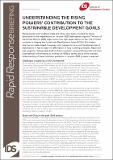| dc.contributor.author | Constantine, Jennifer | |
| dc.coverage.spatial | Brazil | en |
| dc.coverage.spatial | China | en |
| dc.coverage.spatial | India | en |
| dc.coverage.spatial | South Africa | en |
| dc.date.accessioned | 2015-03-25T11:17:59Z | |
| dc.date.available | 2015-03-25T11:17:59Z | |
| dc.date.issued | 2015-03-23 | |
| dc.identifier.uri | https://opendocs.ids.ac.uk/opendocs/handle/20.500.12413/5970 | |
| dc.description.abstract | Rising powers such as Brazil, India and China have been criticised for being obstructive in the negotiations on the post-2015 development agenda. The start of the United Nations (UN) negotiations saw high expectations for the role of these countries in shaping the Sustainable Development Goals (SDGs). This leadership has not materialised. However, what appears to be a confrontational style of diplomacy is in fact an assertive affirmation of long-standing principles. Rapid and real progress is being made both in these countries’ national frameworks and their international commitments to making the SDGs a reality, and a more nuanced understanding of these countries’ positions in the post-2015 process is required. | en |
| dc.language.iso | en | en |
| dc.publisher | Institute of Development Studies | en |
| dc.relation.ispartofseries | IDs Rapid Response Briefing;9 | |
| dc.rights | Readers are encouraged to quote and reproduce material from issues of Rapid Response Briefings in their own publication. In return, IDS and the request due acknowledgement and quotes to be referenced as above. | en |
| dc.rights.uri | http://www.ids.ac.uk/files/dmfile/IDSOpenDocsStandardTermsOfUse.pdf | en |
| dc.subject | Millennium Development Goals | en |
| dc.title | Understanding The Rising Powers' Contribution to the Sustainable Development Goals | en |
| dc.type | Rapid Response Briefing | en |
| dc.rights.holder | Institute of Development Studies | en |
| dc.identifier.team | Globalisation | en |

